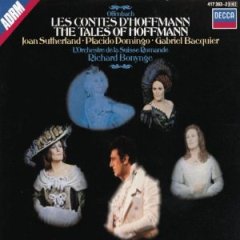Offenbach – Les Contes de Hoffmann (Bonynge) [1990]
Offenbach – Les Contes de Hoffmann (Bonynge) [1990]

Disc: 1 1. Prologue. Glou! glou! glou! je suis le vin! 2. Prologue. Dans les rôles d'amoureux langoureux 3. Prologue. Allons, allons mes enfants! Préparez cette salle 4. Prologue. Eh! Luther! Ma grosse tonne 5. Prologue. Il était une fois à la cour d'Eisenach 6. Prologue. Peuh! cette biÃ..re est détestable! 7. Prologue. Et par où votre diablerie 8. Prologue. Entr'acte 9. Act 1. Allons! Courage et confiance 10. Act 1. Pardieu! J'étais bien sûr de te trouver ici! 11. Act 1. J'ai des yeux, de vrais yeux 12. Act 1. Non, aucun hôte, vraiment 13. Act 1. Les oiseaux dans la charmille 14. Act 1. Ils se sont éloignés enfin! 15. Act 1. Tu me fuis? qu'ai-je fait? 16. Act 1. Voici les valseurs! 17. Act 2. Belle nuit, ô nuit d'amour 18. Act 2. Amis! l'Amour tendre et rêveur 19. Act 2. Au jeu, au jeu, messieurs! Disc: 2 1. Act 2. Scintille, diamant 2. Act 2. A nous trois, mes maîtres! 3. Act 2. Malheureux, tu ne comprends donc pas 4. Act 2. Que vais-je faire? Quel est ce breuvage? 5. Act 3. Elle a fui, la touterelle 6. Act 3. Jour et nuit je me mets en quatre 7. Act 3. C'est une chanson d'amour qui s'envole 8. Act 3. Que veux-tu faire? 9. Act 3. Tu ne chanteras plus... sais-tu quel sacrifice 10. Act 3. Intermède-Entr'acte 11. Epilogue. Voilà, mes amis, quelle fut l'histoire de mes trois amours 12. Epilogue. Messieurs, le souper est servi! 13. Epilogue. Et moi? Moi, la fidèle amie 14. Epilogue. Adieu! Je ne veux pas te suivre 15. Epilogue. Jusqu'au matin remplis, remplis, mon verre! Plácido Domingo (tenor) Hoffmann Dame Joan Sutherland (soprano) Olympia, Giulietta, Antonia, Stella Gabriel Bacquier (baritone) Lindorf, Coppélius, Dapertutto, Dr Miracle Huguette Tourangeau (mezzo-soprano) La Muse, Nicklausse Jacques Charon (tenor) Spalanzani Hugues Cuénod (tenor) Andrès, Cochenille, Pitichinaccio, Frantz André Neury (baritone) Schlemil Paul Plishka (bass) Crespel Margarita Lilowa (mezzo-soprano) Voice of Antonia’s Mother Roland Jacques (baritone) Luther Lausanne Pro Arte Chorus, Du Brassure Chorus, Suisse Romande orchestra Richard Bonynge - conductor
This is the first of many recordings that attempts to return this opera--which the composer left unfinished at his death--to something more in line with what he envisioned. While it may work in the theater, it seems fitful on record, particularly with spoken dialogue. The cast, with Plácido Domingo in the title role and Joan Sutherland playing all three heroines in the flashbacks, has long made this recording a first-choice Hoffmann among some critics. But Domingo lacks the ideal vocal elegance, and having three different personalities as the heroines can be much more interesting. This recording does have some famous French character singers in its favor--Hugues Cuénod and Gabriel Bacquier--but this may be mostly for Sutherland fans. ---David Patrick Stearns, amazon.com
Plácido Domingo ten Hoffmann; Dame Joan Sutherland sop Olympia, Giulietta, Antonia, Stella; Gabriel Bacquier bar Lindorf, Coppélius, Dapertutto, Dr Miracle; Huguette Tourangeau mez La Muse, Nicklausse; Jacques Charon ten Spalanzani; Hugues Cuénod ten Andrès, Cochenille, Pitichinaccio, Frantz; André Neury bar Schlemil; Paul Plishka bass Crespel; Margarita Lilowa mez Voice of Antonia’s Mother; Roland Jacques bar Luther
This is a wonderfully refreshing set. The story emerges crystal-clear, even the black ending to the Giulietta scene in Venice, which in Bonynge’s text restores the original idea of the heroine dying from a draught of poison, while the dwarf Pitichinaccio shrieks in delight. One also has to applaud his rather more controversial decision to put the Giulietta scene in the middle and leave the dramatically weighty Antonia scene till last. That also makes the role of Stella the more significant, giving extra point to the decision to have the same singer take all four heroine roles. With Dame Joan available it was a natural decision, and though in spoken dialogue she’s less comfortable in the Giulietta scene than the rest, the contrasting portraits in each scene are all very convincing, with the voice brilliant in the Doll scene, warmly sensuous in the Giulietta scene and powerfully dramatic as well as tender in the Antonia scene. Gabriel Bacquier gives sharply intense performances, firm and dark vocally, in the four villain roles, Hugues Cuénod contributes delightful vignettes in the four comprimario tenor roles, while Domingo establishes at the very start the distinctive bite in his portrait of Hoffmann; a powerful and a perceptive interpretation. The recording is vivid, and the listener is treated to some first-class playing from the Suisse Romande Orchestra. ---gramophone.co.uk
download: uploaded yandex 4shared mediafire solidfiles mega filecloudio nornar
Zmieniony (Wtorek, 04 Marzec 2014 21:28)








